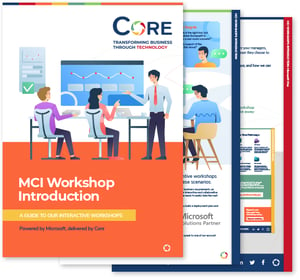The cloud has been at the centre of the remote working revolution, both before and during the Covid-19 pandemic. Cloud solutions have been enabling organisations to offer remote working that is secure, flexible and allows people to do their jobs effectively from almost any location, for years.
With home working set to stay for many organisations, the way we work has changed profoundly and permanently. And while organisations that were already using cloud services have managed to transition to a remote working model seamlessly, for others, adapting and implementing cloud solutions quickly in response to the pandemic has been a challenge.
For these companies, there may be issues of trust around moving to the cloud; this is especially prevalent in the financial and legal sectors, where sensitive and highly confidential client data is stored. Other organisations might want to use the cloud for some applications and scenarios, but not others, leaving them confused about how, and even whether, this is possible.
The good news is, it is possible and even preferable, to keep some applications on-premise, and others in a mix of public and private cloud. This approach is called hybrid cloud and it’s an increasingly popular method of cloud migration for companies who are making a gradual transition to being cloud-based, and for those who simply choose to keep some applications on-premise.
Find out more about which apps lend themselves to being in the cloud, how to identify them and adopting a hybrid approach here.
In this blog, we explore the pros, cons and implications of a hybrid cloud approach for business and explain how to implement it in your organisation if you decide it’s the right choice for you.
What is hybrid cloud?
Hybrid cloud is the term used to describe a mixed computing environment, where your data, applications and infrastructure are shared between on-premises environment or private cloud and public cloud platforms like Microsoft Azure and Amazon Web Services.
If ‘public cloud’ sends you into a panic over the privacy and security of your data, find out why public cloud doesn’t really mean public here.
Employing a hybrid cloud approach gives organisations flexibility to seamlessly scale their on-premises infrastructure up to the public cloud and lets them move workloads between public and private clouds in line with your needs.
Main benefits
The main benefit of hybrid cloud services is that they enable business transformation and agility. Employing a combination of on-premise, private and public cloud services gives organisations the agility and versatility to adapt to rapidly changing circumstances and business needs, which gives a competitive advantage.
Hybrid cloud enables enterprises to host sensitive data and critical workloads on an on-premises private cloud, and less sensitive workloads on a public cloud. Hybrid cloud is also a suited to changeable workloads, like those that experience seasonal peaks in demand. In this case, applications can run in private cloud for the most part but use “cloud bursting” during peaks in demand using extra resources from a public cloud.
Public cloud: pros and cons
When you use public cloud services, like Microsoft Azure, it’s almost like “renting” space in their infrastructure. The pros of this, is that they are flexible, letting you scale up and down as you need. They’re also more efficient and cost-effective than on-premises data centres, because nearly everything is automated. The initial expenditure is lower, because you don’t need to buy your own datacentre equipment, and because services are spread and backed up across multiple datacentres they are very reliable. On the downside, you may feel you have less control over your data as it sits in multiple places (although it is secure), and costs will rise as you scale up (although you’ll still only be paying for whatever you use).
Private cloud: pros and cons
Setting up a private cloud means you have a dedicated cloud infrastructure exclusively for use by your organisation. You can manage
Private cloud offers security advantages because you will have full control on hardware components and physical location where your data and apps are stored and only accessible by your enterprise. Private cloud is ideally suited to storing sensitive data, but it also lets you move non-sensitive data from the private to public cloud if you have a sudden compute demand on your private cloud. You can also customise your servers and preferences to suit the needs of your organisation. On the downside, there are higher initial costs associated with private cloud, because you will need to pay for equipment. Your enterprise will be solely responsible for maintaining and upkeep of the datacentre, hardware and software, and security. Private cloud is also less flexible in allowing you to scale up or down at will by simply “renting” more space like public cloud allows.
Use cases and business scenarios
You are moving to the cloud gradually
If your organisation is moving to the cloud incrementally, a hybrid approach can help you work out what works best for you. You can grow your public or private cloud consumption as and when you need before choosing one or the other, or a hybrid approach
Your workloads are frequently changing
If you have workloads that are frequently changing, hybrid cloud lets you use the public cloud for dynamic workloads and private cloud or on-prem resources for confidential or sensitive data.
You have a mix of critical and non-sensitive workloadsUnless you absolutely must use private or public cloud, then hybrid can give you the best of both worlds and give you the advantages that come with both.
You need to be flexible
A hybrid cloud environment gives flexibility to use public, private or on-premises infrastructure which you can choose depending on your needs at any given time.
Want to know if you're ready to move to the cloud? Download our Cloud Migration Checklist.
Challenges of hybrid cloud
Although there are lots of benefits to a hybrid cloud environment, it does also present some challenges, both technical and from a business perspective.
Connectivity issues and service disruptions can arise, which can potentially breach service level agreements (SLAs). A workaround of this, is to devise hybrid cloud workloads that operate with multiple public cloud providers, but this also leads to a more complicated setup.
Constructing and maintaining the private cloud can also be challenging. Businesses need to have the right expertise terms of IT staff and cloud architects to get the private cloud up and running and oversee its ongoing maintenance. This is made even more complex when databases and other software are added to the mix. And when an enterprise is responsible for the technical support of its private cloud, it also has to adapt and accommodate API changes in the public cloud.
Is hybrid cloud right for you?
Lots of things affect whether hybrid cloud is the right choice for your organisation.
Many enterprises choose hybrid cloud because it offers the benefits of both private and public clouds while also allowing you to continue to use your existing architecture for some parts of your IT.
Hybrid clouds lets apps interoperate between the different types of cloud and even different architectures. And lots of organisations possess different types of data – not everything should be stored in a public cloud, but equally, not all data and apps need to be stored privately.
Workloads are also always changing. Where some data or apps have been stored traditionally might not be the best place for them now or in the future. Hybrid cloud allows you to utilise the different types of cloud and your existing on-premise infrastructure which work together while also maintaining distinction between them.
Next steps
Challenge us to build your roadmap to an advanced collaborative working environment, with better access to services and faster outcomes using a Microsoft enabled cloud-first environment. Contact us here to start the conversation.






b442.png)
9274.png)
